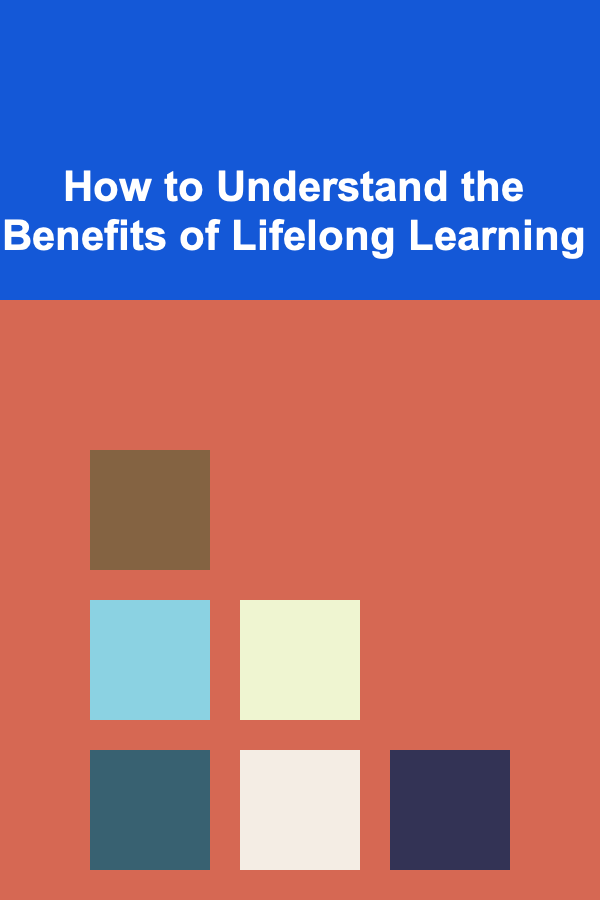
How to Understand the Benefits of Lifelong Learning
ebook include PDF & Audio bundle (Micro Guide)
$12.99$6.99
Limited Time Offer! Order within the next:

Lifelong learning is an essential concept in today's rapidly changing world. It is the continuous, voluntary, and self-motivated pursuit of knowledge for both personal and professional development. Unlike traditional education, which is limited to specific stages in life, lifelong learning occurs throughout an individual's entire life. It can take many forms, ranging from formal education, like attending courses or workshops, to informal learning, such as self-study, online resources, and experiential learning.
In this article, we will explore the significance of lifelong learning, its benefits, and how individuals can harness its power to improve various aspects of their lives. We will delve into why lifelong learning is more than just an academic pursuit, but rather an approach that can help individuals adapt to an ever-evolving world.
Adapting to an Ever-Changing World
One of the most significant benefits of lifelong learning is its ability to help individuals stay relevant in a constantly evolving world. The world we live in is characterized by rapid advancements in technology, changing job markets, and new societal challenges. From artificial intelligence to climate change, there are numerous forces that shape our future, and they do so at an accelerating pace.
Lifelong learning ensures that individuals remain competitive in this fast-paced environment. It allows people to acquire new skills, knowledge, and expertise, making them more adaptable to changes in the workplace and society. For example, in industries like technology, where new programming languages and tools are frequently developed, lifelong learning enables individuals to keep up with the latest trends and innovations, ensuring they are not left behind.
In the same way, lifelong learning provides individuals with the tools to better understand and address societal challenges, such as the complexities of the global economy or the environmental issues we face. By acquiring new knowledge, people can become informed decision-makers and contribute meaningfully to solving problems that affect their communities and the world at large.
Enhancing Career Opportunities
Another key benefit of lifelong learning is the enhancement of career prospects. In today's competitive job market, skills can become outdated quickly, and employers are always seeking individuals who can bring fresh ideas and expertise to the table. Lifelong learning is a powerful tool for improving one's employability and career growth.
By engaging in ongoing education, whether through formal certifications or informal learning experiences, individuals can acquire new skills and qualifications that open doors to new job opportunities or promotions. For example, professionals in fields like healthcare, education, and finance often need to pursue ongoing training to meet changing industry standards or regulations. Lifelong learning enables them to stay ahead of the curve, boosting their career potential.
Additionally, lifelong learning can make individuals more versatile in the workforce. Acquiring new skills, such as learning a foreign language or mastering new technology, can increase job mobility and allow individuals to pursue a variety of career paths. This flexibility is particularly important as people live longer and may experience multiple career shifts throughout their lifetimes.
Boosting Personal Fulfillment and Confidence
Lifelong learning is not just about career advancement; it is also about personal growth and self-fulfillment. Engaging in learning activities that stimulate the mind can be deeply satisfying and rewarding. Whether it's learning a new language, studying history, or mastering a musical instrument, the pursuit of knowledge brings a sense of accomplishment and joy.
Moreover, the process of learning itself can increase an individual's confidence. As people acquire new skills and knowledge, they become more self-assured in their abilities and more capable of taking on challenges. This increased self-confidence can extend beyond personal endeavors, helping individuals build stronger relationships, assert themselves in professional settings, and take on leadership roles within their communities.
Lifelong learning also provides a sense of purpose, particularly during transitions in life. As people age or experience significant changes in their careers or personal lives, they may feel a loss of direction or a sense of stagnation. Engaging in new learning experiences can give individuals a renewed sense of purpose, helping them stay mentally engaged and motivated to continue growing.
Improving Cognitive Function and Mental Health
Engaging in lifelong learning can have significant positive effects on cognitive function and mental health. Studies have shown that learning new things stimulates the brain, enhancing its ability to retain and process information. Whether it's solving a complex problem or engaging in creative thinking, learning challenges the brain and promotes neural plasticity---the brain's ability to form new connections and adapt.
For older adults, lifelong learning is especially beneficial for maintaining cognitive health. Mental activities that require focus, memory, and problem-solving have been shown to reduce the risk of cognitive decline and delay the onset of conditions such as dementia and Alzheimer's disease. By continually exercising the brain through lifelong learning, individuals can keep their minds sharp and reduce the likelihood of mental deterioration as they age.
In addition to cognitive benefits, lifelong learning can have a positive impact on emotional well-being. Engaging in new learning experiences can provide a sense of accomplishment and improve mood. It can also offer opportunities for social interaction, as individuals may take classes, join learning groups, or participate in online forums that provide a sense of community and connection.
Fostering Creativity and Innovation
Lifelong learning encourages creativity by exposing individuals to new ideas, perspectives, and approaches. When individuals engage in diverse learning activities, they broaden their horizons and develop a greater understanding of different fields and disciplines. This broadening of knowledge can spark new ideas, enhance problem-solving skills, and foster innovation.
In the workplace, this creativity can lead to new ways of thinking and improved processes. Employees who engage in lifelong learning often bring fresh perspectives to their teams, helping organizations innovate and adapt to changing circumstances. Creativity is particularly important in industries like design, technology, and entrepreneurship, where new ideas are the foundation of success.
Moreover, learning new skills or knowledge outside of one's usual area of expertise can promote interdisciplinary thinking. This type of thinking is essential for solving complex problems that require diverse approaches. For instance, innovations in fields like environmental science often result from the intersection of disciplines such as biology, engineering, and economics.
Building Resilience and Overcoming Challenges
Life is full of challenges, both personal and professional. Lifelong learning can help individuals build resilience by teaching them how to approach problems with a growth mindset. When individuals engage in continuous learning, they learn how to deal with setbacks and challenges, viewing them as opportunities for growth rather than obstacles.
The process of learning itself encourages persistence and problem-solving. When individuals tackle difficult concepts or skills, they learn how to persevere through frustration and failure. This ability to handle adversity can be transferred to other areas of life, helping individuals navigate personal difficulties, career setbacks, and other challenges with greater resilience and determination.
Lifelong learning also encourages self-reflection, which is a crucial aspect of personal development. As individuals reflect on what they have learned and how it applies to their lives, they gain insights into their own strengths, weaknesses, and values. This self-awareness can help individuals make more informed decisions, set meaningful goals, and align their actions with their long-term aspirations.
Strengthening Social Connections and Communities
Lifelong learning also plays a critical role in strengthening social bonds and fostering a sense of community. Learning is often a social activity, whether it involves participating in group classes, attending seminars, or engaging in online discussions. These social interactions can lead to the formation of valuable connections and relationships.
In addition to the personal benefits, lifelong learning can contribute to stronger communities. When individuals in a community pursue learning together, they share knowledge, skills, and experiences that enrich the collective well-being. Communities that value education and personal development are often more resilient, collaborative, and proactive in addressing challenges.
Furthermore, lifelong learning promotes inclusivity by providing opportunities for individuals from diverse backgrounds to come together and learn from one another. By fostering a culture of learning, societies can break down barriers and create more equitable opportunities for people to thrive.
How to Start Engaging in Lifelong Learning
For those who have yet to embrace lifelong learning, starting can feel overwhelming. However, the process doesn't have to be complicated or intimidating. Here are some practical tips to begin your lifelong learning journey:
- Set Clear Learning Goals: Determine what you want to learn and why it matters to you. Setting clear, achievable goals can help you stay motivated and focused on your learning journey.
- Explore Different Learning Formats: Lifelong learning can take many forms, from online courses and books to podcasts and workshops. Experiment with different formats to find what works best for you.
- Commit to Regular Learning: Set aside time each week for learning. Whether it's reading an article, watching a documentary, or taking an online course, consistency is key to making lifelong learning a habit.
- Engage with Others: Join learning communities, whether in-person or online. Sharing your experiences and learning from others can enhance the process and help you stay motivated.
- Stay Curious: Lifelong learning is about cultivating curiosity. Stay open to new ideas and perspectives, and always be willing to explore topics outside of your comfort zone.
Conclusion
Lifelong learning is more than just an academic pursuit; it is a mindset and lifestyle that empowers individuals to adapt to a changing world, improve their careers, boost personal fulfillment, and enhance cognitive and mental health. By continuously seeking new knowledge and skills, individuals can remain competitive, creative, and resilient in the face of life's challenges. Ultimately, lifelong learning fosters a sense of purpose, strengthens social connections, and contributes to the overall well-being of individuals and communities.
As we look to the future, the importance of lifelong learning will only continue to grow. In a world where change is constant and the demand for new skills is ever-present, embracing lifelong learning is not just an option but a necessity for success and fulfillment in both personal and professional life.

How to Organize Your Email Inbox for Maximum Productivity
Read More
How To Master Downhill Skiing for Speed
Read More
How to Hike in Hot Weather Safely
Read More
Applying AI in Marketing and Sales: A Deep Dive
Read More
How to Plan for College Savings with a 529 Plan
Read More
How to Identify Common Fossil Plants
Read MoreOther Products

How to Organize Your Email Inbox for Maximum Productivity
Read More
How To Master Downhill Skiing for Speed
Read More
How to Hike in Hot Weather Safely
Read More
Applying AI in Marketing and Sales: A Deep Dive
Read More
How to Plan for College Savings with a 529 Plan
Read More